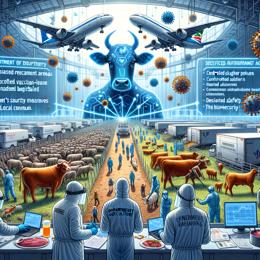Picture: for illustration purposes
China Nears Commercialisation of Genetically Modified Maize and Soybeans
Following Reuters’ recent report, it appears China is bridging the gap to commercialise the cultivation of genetically modified (GM) maize and soybeans. China’s approval of the 37 genetically modified maize and 14 soybean seed varieties indicates a move towards commercial planting – a major milestone in China's vibrant agricultural sector.
This progression didn't occur overnight. Over a decade ago, back in June 2013, the Chinese National Crop Variety Approval Committee released two standards that paved the way for the domestic cultivation of genetically modified crops. This legislation set a course for the potential commercialization of GM maize and soybeans in China, under the key condition of two necessary legal steps: a “safety certificate” and “variety approval”.
The safety check for various seed types was completed in 2019, whilst the last crucial puzzle piece – the variety approval – was bestowed in June 2022. These steps underpin China's commitment to improving crop yield efficiency while paying due regard to the safety and environmental implications of these crops.
Though commercial cultivation isn't ratified yet, the approval of the diverse range of maize and soybean seeds adds weight to the indication that it may happen soon.
China exhibits no prohibition towards GM crops. In fact, the nation imports large quantities of GM maize and soybeans. However, the restriction on domestic cultivation is expected to change with these regulatory advancements, with boosted crop yields as the potential benefit.
Genetically modified seeds can offer several plus points, such as elevated crop yields, a reduction in insecticide usage, and more environmentally considerate farming methods, as experienced in countries where GM seeds have been widely adopted – such as the United States, Brazil, and Argentina.
Therefore, with the premise of improved crop yield, China might gradually lessen its maize and soybean import dependence – an outcome that would undeniably ripple into global trade and prices.
This development deserves attention, particularly from African countries that are yet to embrace the cultivation of genetically modified crops. South Africa is one such nation that has experienced increased yields through adoption of this technology. With Africa’s struggle to meet annual food requirements, the implementation of modern farming technologies presents a promising solution.
Nonetheless, the course of adopting genetically modified crop cultivation is fraught with challenges about seed ownership and access for small-scale farmers. Addressing these issues are crucial elements in successfully establishing agreements with seed breeders and technology developers, while maintaining innovation.
Meanwhile, South African farmers and agri-businesses should watch how the situation unfolds in China. Increased competition and potential pressure on prices could arise due to China's swelling maize production. South Africa, a major maize exporter, needs to keep a close eye on China's development, as it could lead to exploration of new markets, a challenging but necessary prospect. However, making immediate drastic decisions would be premature. Instead, vigilantly watching the commercialisation timeline and considering possible options at the appropriate time would be prudent.










